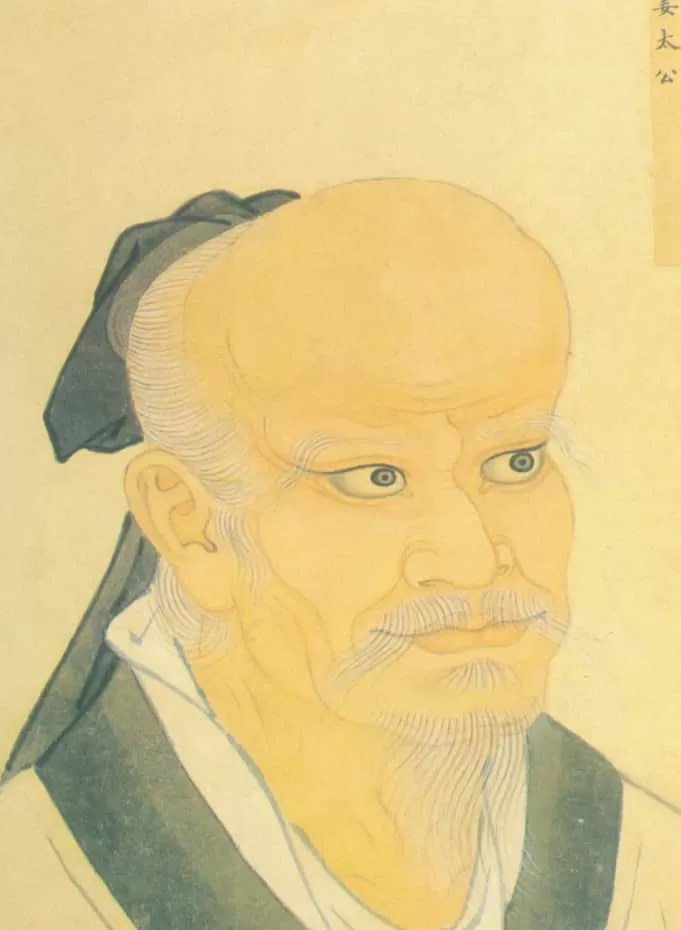
Jiang Taigong (? - 1015 BC or 1036 BC), surnamed Jiang and styled Lv, with the given name Shang or Wang, and the courtesy name Ziya (or simply "Ya"), was later known as Jiang Ziya, Duke Taigong of Qi, Teacher Shangfu, Duke Taigong Wang, Lv Wang, Lv Shang, and Jiang Shang among others. His ancestral home is debated as being "east of the Eastern Sea" (modern Rizhao, Shandong) or Jixian County, Heyi Prefecture (modern Weihui, Henan). He was a military strategist, politician, strategist, and thinker at the end of the Shang Dynasty in China, and a founding father of the Western Zhou Dynasty.
Jiang Taigong was erudite and diligent, proficient in astronomy and geography, and deeply versed in the ways of governing and securing the state. Born during the reign of King Zhou of Shang, his talents went unrecognized, and he "once slaughtered cattle in Chaoge and sold drinks in Mengjin." Later, King Wen of Zhou met Jiang Taigong on the north bank of the Wei River and requested to "bow and take him as a teacher." Another account states that due to King Zhou's tyranny, Jiang Taigong hid by the seashore and was recruited by San Yisheng and Hong Yao to serve the Zhou state. After King Wu of Zhou ascended the throne, he honored Jiang Taigong as "Teacher Shangfu." Jiang Taigong was the chief strategist for King Wen's campaign against Shang and King Wu's conquest of Yin, and he played a pivotal role in the Battle of Muye. After the battle, he was enfeoffed in Qi with its capital at Yingqiu, becoming the founder of the Qi state. After King Wu's death, Jiang Taigong, as the Grand Teacher of Zhou, aided King Cheng of Zhou along with Zhou Gongdan and others in suppressing the Rebellion of the Three Guardians and was granted the power to wage war at his discretion. Jiang Taigong passed away at over a hundred years old.
Jiang Taigong successively served four generations of Zhou kings, including Wen, Wu, Cheng, and Kang. He was both a military commander and a political advisor, capable of securing the state with martial prowess and governing with literary virtue. He is regarded as the founder of the Jiang family's Qi state and Qi culture. Taoism honors him as its founder, military strategists revere him as the ancestor of martial arts, and Confucianism, Legalism, and Vertical and Horizontal Strategies all trace their origins back to him. Hence, Jiang Taigong is known as the "Patron Saint of the Hundred Schools." The rulers of the Tang Dynasty posthumously honored Jiang Taigong as "King Wucheng" (with the posthumous title "Zhaolie" added in the Song Dynasty), and established the Temple of King Wucheng for him, placing him alongside Confucius, the "King Wenxuan." In folklore, his image was deified, appearing widely in literature, theater, and film and television creations. His works include The Military Strategies of Jiang Taigong and The Golden Chest of Jiang Taigong, both of which are lost. The military treatise The Six Strategies is said to be authored by him (though some believe it to be a pseudonymous forgery).
Provides The Most Comprehensive English Versions Of Chinese Classical Novels And Classic Books Online Reading.
Copyright © 2025 Chinese-Novels.com All Rights Reserved
